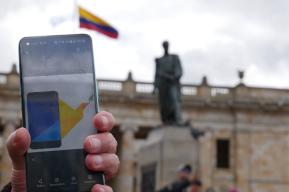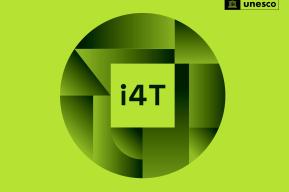Article
UNSSC and UNESCO bolster learning on Freedom of Expression, Access to Information, and Safety of Journalists

Self-pace course on freedom of expression, access to information and safety of journalists

The United Nations System Staff College (UNSSC) and UNESCO launched a new self-paced online course on freedom of expression, access to information, and the safety of journalists. The course is part of an ongoing partnership where both organizations agreed to join forces on a number of initiatives to strengthen the capacity of the United Nations system, particularly at the regional and country levels, to address these important issues.
This partnership with United Nations System Staff College aims at upscaling the UN-wide understanding of the rights to freedom of expression, access to information and safety of journalists – by leveraging international human rights standards on these priorities. “The outcomes of the joint action will advance progress on SDG target 16.10 and the implementation of the UN Plan of Action on the Safety of Journalists and the Issue of Impunity launched 10 years ago”, said Tawfik Jelassi, UNESCO Assistant Director-General for Communication and Information.
As the world commemorates the International Day to End Impunity for Crimes against Journalists on November 2 and marks the 10th anniversary of the UN Plan of Action on the Safety of Journalists and the Issue of Impunity this year, this partnership could not come at a better time to reiterate the call for a coalition-based and holistic approach, including at the UN level.
Many journalists continue to face challenges when it comes to freedom of expression, access to information, and their safety. UNESCO reports that on average, every five days a journalist is killed for bringing information to the public. These attacks include murder, abductions, harassment, intimidation, illegal arrest, and arbitrary detention. Journalists are censored, intimidated, attacked and often have to grapple with defamatory laws in the contexts in which they work.
Silencing journalists is a threat to all human rights, promoted and protected by the United Nations as its key purpose and guiding principle. Therefore, a joint UN effort is needed to address the challenges and threats facing journalists and media workers. Protecting journalists means protecting freedom of expression and enabling access to information for all. In that perspective, this new self-paced online course is therefore introduced to serve as a great resource for different United Nations stakeholders particularly resident coordinator offices, and UN Country Teams.
The course includes four modules showcasing the interlinked topics above, as well as relevant subtopics such as hate speech, disinformation, the role of media during elections, and the United Nations human rights monitoring mechanisms.
"I am thrilled that we were able to develop this new self-paced course in partnership with UNESCO. The collaboration represents a unique and critically important partnership in the necessary work of raising awareness about freedom of expression, access to information, and the safety of journalists. This free self-paced course will open numerous opportunities for learning targeted at UN personnel at the regional and country levels. At the Staff College we remain committed to eliminating learning barriers that can hold back UN Country Teams. With the right level of learning support, UN Country Teams can succeed at being active and productive participants in our vision to build a sustainable future for all,” said Jafar Javan, UNSSC Director.
The course is available on UNSSC’s Blue Line learning hub for personalized and self-directed learning. All the topics - freedom of expression, safety of journalists, and access to information will be explored practically through interactive learning material and a rich set of resources for later reference.
Access the course here: https://www.unssc.org/courses/self-paced-online-course-freedom-expression-access-information-and-safety-journalists
The self-paced online course is the second in a number of other initiatives: in-person regional workshops, webinars, and advocacy initiatives that are planned under the UNSSC-UNESCO partnership, funded with the support of UNESCO’s Multi-donor Programme on Freedom of Expression and the Safety of Journalists (MDP).
About UNSSC and UNESCO partnership
In May 2022 UNSSC and UNESCO with the support of the United Nations Resident Coordinator in Uruguay, Mr. Pablo Ruiz Hiebra hosted the first United Nations Regional Workshop on Freedom of Expression, Access to Information, and Safety of Journalists for Latin America and the Caribbean in Punta del Este, Uruguay. The workshop brought together UN Country Team representatives from the Latin America and Caribbean (LAC) region and was organized on the sidelines of the Global Conference for World Press Freedom Day with the aim of strengthening UN action on freedom of expression, access to information, and safety of journalists in the region. Speakers at the workshop included Advisors from the Office of the High Commissioner for Human Rights (OHCHR) and representatives from regional civil society organizations (CSOs). Together with the attendees, they identified challenges and explored solutions to freedom of expression safety of journalists and access to information in the course of their work.
The ongoing partnership and the launch of the self- paced online course are considered very timely as this year marks the 10th anniversary of the endorsement of the UN Plan of Action on the Safety of Journalists and the Issue of Impunity by the UN Chief Executives Board (CEB). The course and the related initiatives are expected to give participants the tools, resources and insights they need in line with the UN Plan of Action.
Visit the UNESCO website for more information about the 10th Anniversary of the UN Plan of Action:https://www.unesco.org/en/articles/10th-anniversary-un-plan-action-safety-journalists
About the Multi-donor Programme on Freedom of Expression and Safety of Journalists
The Multi-Donor Programme on Freedom of Expression and Safety of Journalists (MDP) serves to further strengthen UNESCO’s work at a global, regional, and national levels, by channeling funds towards emerging priorities and the most pressing needs to achieve its mandate on freedom of expression, media development, and media and information literacy.
Protect free, independent and pluralistic media, visit the MDP website.







